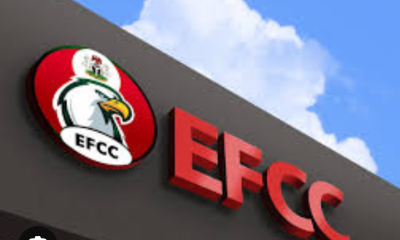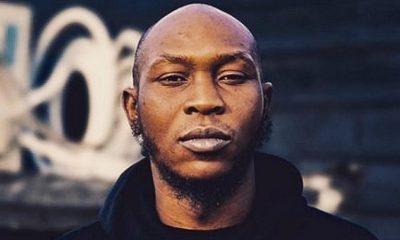Economy
Restrict tariff plans to seven, NCC tells telcos

The Nigerian Communications Commission has issued a directive to all telecommunications operators in the country, mandating them to restrict the number of available tariff plans to a maximum of seven.
A tariff plan is a structured pricing scheme that outlines the charges and conditions under which telecommunications services are provided to subscribers.
The NCC also approved new tariff guidelines for operators, which it said were designed to enhance transparency, improve consumer understanding, and foster fair competition amongst licensees of the commission.
The commission disclosed this in a document posted on its website and signed by the Executive Vice-Chairman of the commission, Aminu Maida.
The document read partly, “The number of tariff plans offered per operator is limited to seven and the number of bundles offered per operator is limited to 100.
“There are no limitations to the number of Add-ons a subscriber can opt into. However, each operator must have in place a mechanism that informs subscribers of the number of Add-ons they have at the point of purchasing another Add-on. Subscribers must be able to check (via USSD string, SMS) the number of Add-ons purchased.”
Checks by our correspondent showed that the two major telecommunications companies currently offer more tariff plans than the stipulated number in the directive.
MTN has eight tariff plans, Etisalat has seven, Airtel has 10 plans and Glo offers its customers four tariff plans.
In the document, titled, ‘Guidance for the Simplification of Tariffs,’ the NCC stated that the full disclosure of all tariff components and conditions is mandatory, asking telcos to ensure that all marketing and promotional materials are clear and comprehensible.
The NCC added that operators should prioritise consumer education and transparency in all communications to ensure subscribers can make informed choices.
“Develop and submit detailed migration plans to transition subscribers smoothly to new tariff plans, without loss of service quality or benefits.
“All promotional elements must receive prior approval from the Commission and should be offered as standalone products with clear terms and validity periods.
“Submit comprehensive periodical reports detailing all active tariff plans, bundles, promotions, and Quality oS metrics. The guidance shall take effect on July 29 and will remain valid and binding on licensees until further reviewed by the commission,” the regulators said.
Meanwhile, operators have debunked claims of a tariff increase approval by the commission.
A text sent to our correspondent by the Chairman of the Association of Licensed Telecom Operators in Nigeria, Gbenga Adebayo, on Saturday simply stated, “Telcos have not been granted any approval for tariff review.”
Also, calls and text messages sent by our correspondent showed that the rates are still the same.
Economy
75.5% of rural Nigerians now live below poverty line — World Bank

The World Bank has disclosed that a staggering 75.5 per cent of rural Nigerians are now living below the poverty line, reflecting deepening hardship in the country’s hinterlands.
This was revealed in the Bank’s April 2025 Poverty and Equity Brief for Nigeria, which paints a grim picture of worsening economic hardship, widening inequality, and persistent underdevelopment across much of the nation.
While poverty is widespread among urban populations, the report emphasised that the situation is significantly worse in rural areas, where economic stagnation, high inflation, and insecurity have exacerbated living conditions.
“Based on the most recent official household survey data from Nigeria’s National Bureau of Statistics, 30.9 per cent of Nigerians lived below the international extreme poverty line of $2.15 per person per day in 2018/19 before the COVID-19 pandemic,” the report stated.
The report also highlighted Nigeria’s enduring regional disparities. “Nigeria remains spatially unequal. The poverty rate in northern geopolitical zones was 46.5 per cent in 2018/19, compared with 13.5 per cent for southern ones. Inequality measured by the Gini index was estimated at 35.1 in 2018/19.
“Nigeria’s Prosperity Gap — the average factor by which individuals’ incomes must be multiplied to attain a prosperity standard of $25 per day for all — is estimated at 10.2, higher than most peers.”
Despite successive policy interventions, these figures underscore a persistent economic divide across the country.
The report’s demographic analysis found that children aged 0 to 14 years had a poverty rate of 72.5 per cent, reflecting the scale of deprivation among the youngest segment of the population.
Gender disparities were also observed, with 63.9 per cent of females and 63.1 per cent of males classified as poor under the $3.65 per day lower-middle-income threshold.
Education emerged as a significant determinant of poverty, with Nigerians lacking formal education experiencing a poverty rate of 79.5 per cent. This contrasts with 61.9 per cent for those with primary education and 50.0 per cent for secondary school graduates. Only 25.4 per cent of those with tertiary education were considered poor.
The report also drew attention to multidimensional poverty indicators, which further reflect widespread deprivation.
According to the World Bank, about 30.9 per cent of Nigerians live on less than $2.15 daily, 32.6 per cent lack access to limited-standard drinking water, 45.1 per cent do not have limited-standard sanitation, and 39.4 per cent have no electricity.
Education access remains a challenge, with 17.6 per cent of adults yet to complete primary education, and 9.0 per cent of households reporting at least one school-aged child not enrolled in school.
The report noted that even before the COVID-19 pandemic, efforts to reduce extreme poverty had largely stalled.
“Before COVID-19, extreme poverty reduction had almost stagnated, dropping by only half a percentage point annually since 2010. Living standards of the urban poor are hardly improving, and jobs that would allow households to escape poverty are lacking,” the report read.
Although the World Bank acknowledged recent economic reforms aimed at stabilising Nigeria’s macroeconomic outlook, it warned that persistently high inflation continues to undermine household purchasing power, particularly in urban areas where incomes have not kept pace with rising costs.
In light of the worsening situation, the Bank called for urgent policy action to shield vulnerable groups from inflationary shocks and to drive job creation through more productive economic activities.
Economy
Naira Records Marginal Decline Against Dollar at Official Market

The Nigerian naira experienced a mild drop in value on Friday, closing at ₦1,602.18 per dollar in the official foreign exchange market, based on figures released by the Central Bank of Nigeria (CBN).
This marks a decrease of ₦5.49 from the rate of ₦1,596.69 recorded on April 30, the last trading day before the May 1 Workers’ Day holiday—indicating a depreciation of approximately 0.34%.
Earlier in the week, from Monday to Wednesday, the naira remained relatively stable, exchanging at ₦1,599.95, ₦1,599.71, and ₦1,596.69 respectively.
Although the local currency showed some consistency mid-week, it wrapped up the week with a loss, following a sligh dip of 0.02% at the beginning of the week
Economy
Black Market Dollar hits N1,610 Amid Economic quagmire

What is the Dollar to Naira Exchange Rate in the Black Market (Also Known as the Parallel Market or Aboki FX)?
Below is the black market exchange rate for the U.S. dollar to the Nigerian naira as of Thursday, May 1, 2025. These are the typical rates at which you can exchange dollars for naira:
Dollar to Naira Black Market Exchange Rate (May 1, 2025):
At the Lagos Parallel Market, also referred to as the black market, Bureau De Change (BDC) operators are buying dollars at ₦1,602 and selling at ₦1,610, according to market sources.
Please note: The Central Bank of Nigeria (CBN) does not recognize or endorse transactions conducted on the parallel market. The CBN advises individuals and businesses seeking foreign exchange to use official banking channels.
-

 News9 hours ago
News9 hours agoWhy ‘VeryDarkMan was arrested – EFCC
-

 News20 hours ago
News20 hours agoMassive turnout as Bishop David Abioye holds first service in new church + Video
-

 Economy20 hours ago
Economy20 hours ago75.5% of rural Nigerians now live below poverty line — World Bank
-

 Entertainment9 hours ago
Entertainment9 hours agoHow I narrowly escaped death in U.S hotel room – Seun Kuti
-

 Education12 hours ago
Education12 hours agoOver 1.5m candidates score less than 200 in 2025 – UTME
-

 News20 hours ago
News20 hours agoHow US-Based Yoruba Monarch Died After Brutal Assault In Oyo Palace, Allegedly Ordered By Alaafin Amid Supremacy Row With Ooni Of Ife
-

 News11 hours ago
News11 hours ago‘S3x is good, I enjoy it,’ Bishop Adejumo tells wives
-

 News19 hours ago
News19 hours ago‘Cabals’ still fighting against our refinery — Dangote






